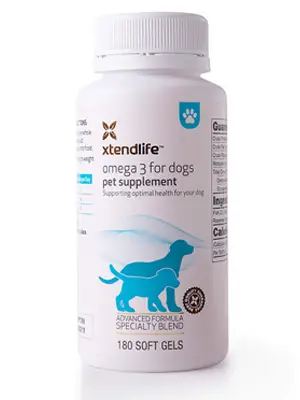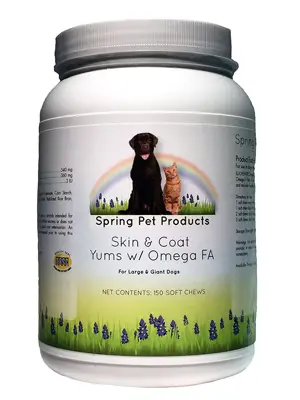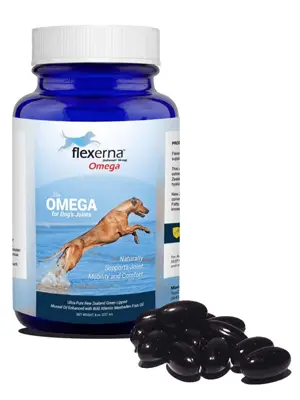Mastiffweb is reader-supported. When you buy through links on our site, we may earn an affiliate commission.
Table of Contents
Best Omega 3 For Dogs
Dogs, like any animal, need lots of energy to get through their day. Fats are an important part of any diet and one of the primary sources of energy that they get is from their diet. Dietary fat contains essential fatty acids and aids in nutrient utilization and transportation within your dog’s internal organs.
The primary benefit of fat in the diet is to facilitate cell integrity and enhance and improve metabolic regulation. Hence, the short and sweet answer is yes, fat is an important component towards a healthy diet for your dog.
Why Your Dog Needs Fats – Why Does Your Dog Need Omega-3?
There are two main kinds of fats – saturated fat and polyunsaturated fat. Saturated fat can be found from animal-based sources and polyunsaturated fats are derived most commonly plant-based sources. Saturated fat provides better and long-lasting fuel for your dog than carbohydrates (which are not even required for the growth and overall well being of your animal as long as sufficient glucose-based elements are present in their diets, such as fats and amino acids).
Fats and oils are made up of fatty acids and are also interchangeably referred to as vitamin F. Fatty acids are present in both plant and animal-based sources. There are two forms of essential fatty acids (EFAs) which are commonly seen as beneficial to your pet’s health – omega-3 and omega-6. Omega 3 for dogs contains alpha-linolenic (ALA), eicosapentaenoic acid (EPA) and docosahexaenoic acid (DHA).
Whenever unsaturated oils get in contact with heat, light or oxygen, they lead to the production of trans-fatty acids and radicals which aren’t harmful. Omega 3 for dogs is not found in cooked or processed food items for dogs. It is for this reason that dog owners usually opt to include omega 3 supplements for dogs or omega 3 chew for dogs to their pet’s diet, which essentially replaces and replenishes this source which got destroyed during the heating process exposure.
Types of Fats
There are certain essential fats that your four-legged friend needs in his diet as their bodies do not make them by themselves. We list five important fatty acids (EFAs) for your dogs that must be included in their routine meals, to ensure that they lead a healthy and balanced life, which means more happiness and less stress for you (avoiding vet visits or even worse expensive hospital bills in the unfortunate case of your dog getting ill or down with a severe disease or infection).
-
- Linoleic Acid (LA)
LA is an Omega-6 fat. It is commonly found in hempseed, soybean, safflower, sunflower and corn oils. Any deficiency of LA leads to coat and skin problems and can make your dog feel tired and sluggish.
- Linoleic Acid (LA)
-
- Alpha-Linolenic Acid (ALA)
ALA is an Omega-3 fat. It is commonly found in flaxseed, chia seed, hempseed and walnut oils. ALA is predominantly used by your pet dog to produce EPA and DHA, which are important for a healthy body, brain, and eyes.
- Alpha-Linolenic Acid (ALA)
-
- Arachidonic Acid (AA)
AA is an Omega-6 fat. Omega-6 is found in meat, poultry, and eggs. AA is the ‘intellect’ fat and its deficiency in your pup’s diet can affect its brain development as it grows.
- Arachidonic Acid (AA)
-
- Eicosapentaenoic Acid (EPA)
EPA is an Omega-3 fat and is also deemed as an anti-inflammatory fatty acid. It is commonly present in oily fish for example salmon, herring and sardines. Any shortage of EPA can lead to depression in your dogs.
- Eicosapentaenoic Acid (EPA)
-
- Docosahexaenoic Acid (DHA)
DHA is an Omega-3 fat that can be found in any oily fish and is key to the development of the brain and eyes. If you want your pups to develop good brain and memory skills and improved eyesight and hearing, then this fat must be included in their diet. Word of caution though: these PUFAs are generally sensitive and must be kept away from oxidation as that will then be counterproductive for your dog’s health and development.
- Docosahexaenoic Acid (DHA)
Balancing the Fats in Dogs
We now know that adding fats to your dog’s diet is a good dietary habit. It has been established that fish oils (source of omega-3) can reduce inflammation and keep certain health conditions at bay such as arthritis or even more concerning ones such as heart diseases or cancer.
Another food item that has anti-inflammatory properties is coconut oil which has other key benefits too such as protecting the dog from various functions antibacterial, antiviral or antifungal. This type of oil also helps with keeping their skin and coat thick and healthy. It also helps in regulating their digestive system.
Having said that, adding fats to your dog’s diet is not a simple and straightforward task where you add drops of fish or coconut oil to their routine meals. There are varying kinds of fats that are beneficial to your dog and the kind of fat that you introduce to their diet will eventually depend on the type of protein they are consuming.
You need to establish and understand what exactly it is that your dog is eating. Let us start with understanding the sources of fats, for example, ruminants, (mammals which have a four-chambered stomach, such as cows, buffalos, sheep, goats, and deer) and poultry (essentially birds which are generally bred and raised to get meat and eggs, such as turkey, chicken or duck).
Whatever the type of fat you choose, it is wise to alternate it in their diet to get a good balance of saturated and polyunsaturated fats.
Ruminants that have been domesticated often contain excess saturated fat (SFA) but not sufficient polyunsaturated fat (PUFA). On the contrary, chicken (even the lean pieces of their meat) contains a high quantity of PUFAs, which in turn, doesn’t require any supplements to EFAs. Hence, by rotating these meat sources, you are balancing the different kinds of fats in your dog’s diet as there is no repetition of a single type of fat going into their digestive system on a routine basis.
It cannot be emphasized strongly enough that you need to include the correct kind of fat to the corresponding kind of meat. The balance in your dog’s diet needs to be achieved; failing which, there will be an imbalance in their diet leading to all sorts of health scares.
Please note that the above solely focuses on the balancing act of using the right fats with the correct protein type. There are other balances that you should be thinking of in terms of your dog’s diet such as minerals and nutrients such as balancing calcium and phosphorus. It is sufficient to mention here that adjusting different protein sources within your dog’s diet will go a long way in addressing a big range of nutrients that their body needs too.
Fatty Acids in Fish Oil
There are so many oils available in the market and it is pertinent to know which one is the best for your dog. There are plant-based sources of omega 3 fatty acid for dogs and then there are animal-sourced oils, such as fish oil. More often than not, animal-sourced oil, such as fish oil, suits them best.
With the plant-based sources, the problem is some dogs, not all of them, are unable to convert this form of oil within their bodies to make them usable. It goes without saying that if you ever decide to include EFAs in your dog’s diet, go for the best quality that is available in the market.
Make sure you read the labels of the product very carefully and ensure that it has been tested as free of contaminants of all kinds, including but not limited to PCBs or heavy metals. Even though fatty acids in fish oil/EFAs are good for your dog, please always exercise moderation (less is more and goes a long way towards the well being of your dog), as overconsumption can affect your dog’s liver and pancreas, by causing them to overwork.
As a rule of thumb, avoid cooked fats and grease or products that are subpar and hence harmful to your dog’s health in the long run.
Benefits of Omega-3 for Dogs
Inflammation and Skin Disorders
Omega-3 fatty acids (decreases inflammation) and omega-6 fatty acids (increases inflammation) work together to tackle inflammation. It is vital to maintain a balance with these two, failing which, the immune system gets impacted. Some inflammatory disorders include allergies and early atopy causing severe itching and even hair loss if the condition worsens. Omega-3 is essential in addressing the symptoms of these skin conditions.
Cognitive Function
Dogs who suffer from age driven changes to their body or mobility can also benefit from omega 3 supplements.
These supplements also assist with neurological functioning, memory, and overall physical performance. Interestingly, there is a remarkable improvement in their ability to recognize family members or other household pets when they consume omega 3.
There is also an improvement in their neuroprotective effect and may delay the early onset of Alzheimer’s disease and can control repetitive behaviors such as excessive licking. Omega 3 can benefit the neurological development in puppies (particularly improved learning and memory function) as well as pregnant and nursing one’s dams too.
Joint Inflammation
Omega 3 can reduce the production of prostaglandins which triggers joint inflammation. That way, dogs can be more agile and have more flexibility.
Heart Issues
Omega 3 can help delay the development of atrial fibrillation (palpitations or irregular heartbeats) and lower other heart problems that may be developing.
It also has properties of an anticoagulant which assists with the prevention of blood clots formation.
A regular dose of these supplements can help the dog lower his blood cholesterol, maintain blood pressure, maintain body weight and reduce the chances of stroke and heart conditions.
Dry, Flaky Skin
A poor coat and skin will eventually lead to itching, irritation, dandruff, shedding, bacterial/yeast infections, and skin allergies. These can be countered by giving your dog a regular dose of omega 3 which will give their coat and skin the much-needed shine.
Other Conditions That Can Be Improved
Plant-based omega 3 can lower the protein loss from its urine, lower blood pressure and minimize the production of inflammatory substances which exacerbate kidney-related diseases.
Moreover, omega 3 (due to its antioxidant properties) is also known to improve stamina, boost energy levels, provide protection from autoimmune diseases, lower the chances of getting a stroke and cancer.
Side Effects – Omega-3 Supplementation
Overdose of omega 3 is not harmful but may have certain side effects that your pet may find discomforting.
Given the anticoagulation properties of omega 3, it may not be apt to use it in conjunction with other blood-thinning, immunosuppression or anti-inflammatory medications that your dog may be taking.
Whenever in doubt, always consult your local vet to cause and ensure that it is safe for him to consume these. Generally, omega 3 fatty acids can be introduced to your dog’s diet as part of a well-balanced diet plan.

Choosing a Good Fish Oil
To certain people, adding dog fish oil to their diet is not an appetizing prospect. This leads them to think about why not consume the actual source directly, i.e. fish.
The answer to that question is fish oil’s texture is much more concentrated and hence much more effective than eating fish when it comes to benefit from fish oil. Just like the fish oil is beneficial for us, it is also fruitful for your mammals.
So if you are concerned about your pup’s joints, brain development, skin and coat, and holistic health, it is important to consider the benefits of fish oils for your pet.
This leads us to the topic of fish oil supplements that are readily available in the market (physical pet stores or online ones) and the choices available to you when it comes to high-quality brands.
This section should provide you with very specific information and recommendations on some of the best supplements of fish oil available so you can make an informed decision for your lovely pet dog.
Fish Oil Supplements
Fish oils are a good source of Omega-3 fatty acids, present abundantly in different cold-water fish such as salmon, mackerel, herring and cod liver. Once fish oil is extracted from these fish, they are then packed and marketed as supplements, available in both forms, tablets or liquid form. It is quite common to mix these oils with certain other vitamins and minerals.
Two specific omega-3 fatty acids in fish oils deserve a special mention given their super benefits to your dog’s health:
- EPA (Eicosapentaenoic Acid)
- DHA (Docosahexaenoic Acid)
These oils are anti-inflammatory and have proven benefits for your pup’s weight control, and general health of their brain and heart.
Taking fish oil supplements is a much easier, faster and effective way to consume than eating the direct source daily, which can be boring and cumbersome. Fish oil supplements are more concentrated and provide with the recommended daily dose which can be bought (by you) and provided and consumed by your dogs without much fuss.
Different Types of Fish Oil Supplements
Fish oil supplements can be added to your dog’s routine kibble meals either as chewable tablets (which can be mixed in their food) or in the form of liquid droplets. The fish oil supplements in the market are usually of two sub-types: regular fish oil and salmon oil. The latter contains omega-3 fatty acids that get specifically extracted from salmon fish (best bet if your dog is allergic or sensitive to other kinds of fish) whereas regular oil is extracted from different forms of cold-water fish.
It is entirely your choice which one you choose for your dog but one thing that you must ensure is to never compromise on the quality of the product which can be tad expensive but best for your pet’s health and well-being.
Benefits of Fish Oils
It is an undisputed and fact that fish oil supplements have great health benefits for humans and dogs alike. Some benefits of EPA and DHA fatty acids are as follows:
- Anti-inflammatory in nature which helps with allergies, arthritis, and inflammation of digestive tracks.
- There are great benefits to fish oil for dogs. Shedding is one of them. It restores shine to the coat and skin and reduces the shedding of hair.
- Maintaining a healthy weight.
- Reducing blood pressure.
- Lowering cholesterol/triglyceride levels.
- Strengthening the immune system.
- Developing cognitive functioning.
- Developing eyes of fetuses in case of pregnant dams.
- Blood-thinning and improved blood circulation which keeps the heart-healthy.
Which Dogs Would Benefit from Supplements
All kinds of dog breeds of different ages and sizes can benefit from a regular dose of fish supplements, but there are specific benefits for dogs who are aged, pups and pregnant dams.
-
- Aged Dogs – particularly those who suffer from arthritis can benefit from such oil and have more flexibility in their joints, hence making their daily routine less painful. Fish oils work by reducing swelling and inflammation in the joint areas. Their blood pressure is reduced, heart functioning improved and cholesterol levels kept in check.
-
- Pups – also benefit massively from fish oil supplements. There are proven studies that demonstrate that the optimum level of DHA leads to easier training of pups, as the fatty acids have a big impact on their cognitive function. Moreover, their immune system is also boosted which helps them to fight diseases and infections which their immune system is exposed to at a young age.
-
- Pregnant Ones – as well are well suited to benefit from fish oil supplementation. These supplements assist with the fetus development, boost their immune system to fight infections and diseases and reduce their blood pressure levels.
Specific Health Conditions
Dogs with dry skin and coat, joint pain issues and who are easily fatigued can benefit hugely from fish oil supplements, as they may be lacking in omega-3. Large dogs (such as Labrador Retrievers, Golden Retrievers, and German Shepherds) are prone to joint problems and can specifically benefit from these supplements.
Effectiveness
The overall health benefits of these supplements sound super. Almost too good to be true! Supplements have a huge market and they sell well. But always bear in mind, they do exactly as their name suggests – they supplement a presumptively healthy diet.
A fish oil supplement cannot undo the damage that has already been done or replace a poor diet or lack of exercise in your pet. It can mitigate the situation though by complimenting the good eating and lifestyle habits of your dog. As a general rule, once you have got your dog into a set eating and exercise routine, you can always subsequently introduce these supplements to give him a wholesome healthy experience.
You also need to be wary of the claims from certain dog food suppliers that they have added fish oil supplements into their kibbles. This is not entirely helpful as omega-3 fatty acids have a sensitive chain that may not be sustained in the food bag for long and hence may not live up to such claims.
As mentioned elsewhere in this guide, these fatty acids are best served as a direct supplement as opposed to a mixture of food. These supplements should always be kept cold in the refrigerator so it is good to be consumed without turning sour or decomposed.
Quality of Supplements
The quality of these supplements is directly proportional to the manufacturing process that they go through. The high quality of the product can only be guaranteed if it is 100% pure, derived naturally from fish and sourced responsibly. No preservatives or fillers should have been used in their production.
Always remember, you pay peanuts, you buy monkeys! A good product with all the above-mentioned qualities will surely come with a reasonable price which you need to compare and assess before purchasing. Your prime focus should be your dog’s health and that is what should be at the forefront of your mind when you are purchasing a good quality supplement.
Our Best 3 Picks
Some of the best omega-3 for dogs are listed below:
Xtend-Life Omega 3 for Dogs
This supplement comes with a price tag of $24.95 for a pack of 180 easy to swallow soft gels (or $19.95 for 120 gels). They are high-grade human strength fish oil. It is high in DHA and 100% pure. For joints, fur, heart, and brain.
Spring Pet Skin & Coat YUMS with Omega-3 Fatty Acids
This spring supplement costs you around $84.95 for a pack of 150 soft chews. It comes with a bonus pet e-care book. NASC (National Animal Supplement Council) seal protected which assures freshness, purity, and use of quality ingredients all produced locally in the United States. For healthy skin and coat, reduced inflammation and healthy joints.
Flexerna Omega Omega 3 & 6, DHA, EPA, ETA
This supplement will cost you $39.95 for a pack of 90 capsules. is ‘Extra Strength’ and has Wild Atlantic fish oil combined with green-lipped mussel. For natural anti-inflammatory needs, hip & joint mobility and dry itchy skin.
Some other options that you may want to consider are:
- Omegease Omega-Rich Fish Oil
- Grizzly Salmon Oil All-Natural Dog Food Supplement
- Zesty Paws Pure Wild Alaskan Salmon Oil for Dogs
- Amazing Nutritionals Omega 3 Chews
- Nordic Naturals Omega 3 Pet Soft Gels
- Pure Paw Pure Alaskan Salmon Oil
FAQ
Can I give my dog fish oil?
Yes. Dogfish oil has multiple health benefits and is undoubtedly one of the best supplements for your canine’s routine diet. It is the best source of omega 3 fatty acids that your four-legged friend needs.
How often should I give my dog fish oil?
You can include dogfish oil as part of their daily diet, subject to confirmation from a local vet. More frequent or overdoses of fish oil can adversely impact your dog’s gastrointestinal system and cause diarrhea. If it is not given at regular intervals then it can cause deficiency.
How much omega 3 to give dog daily?
Dogfish oil dosage should approximately be 300 mg of EPA/DHA combined per 30 pounds of body weight (which you should ensure is correct or close to accurate). Your dog’s weight, size, and other health aspects need to be considered before giving these supplements and it is best to check with your local vet.
Can you give your dog human fish oil capsules?
Dogs weighing less than 10 lbs can take regular strength fish oil capsules that we take (just under 200 mg EPA per dose). For dogs over 50 lbs, extra-strength capsules will work better. Always read labels and dosage recommendations before taking it yourself or providing them to your dog.
Recommended articles:




